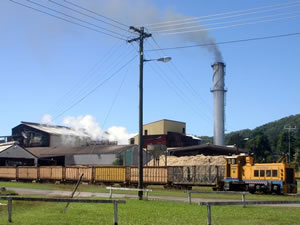
Sweet relief from oil addiction
Thur 15 July
Sweet relief from oil addiction

by Mat Churchill
Biofuels made from plant material is gaining popularity in the search for a replacement for crude oil based fuel, and now a purpose built plant in Mackay has gone a long way towards replacing around 35 per cent of Queensland's unleaded petrol requirements.
The plant, headed by Mackay Sugar was opened last week by Premier Anna Bligh, Federal Minister for Innovation, Industry, Science and Reseach Kim Carr, and Queensland University of Technology's (QUT) Peter Coaldrake.
The plant uses discarded waste from the state's sugar cane crops, and according to QUT's Professor James Dale, has many advantages over traditional resources.
"Bio-based products require less energy to manufacture and produce less greenhouse gas emissions and other pollutants than do fuels and chemicals made from petroleum products." he said.
"These new low greenhouse gas industries have the potential to future-proof Australia from what is becoming a carbon-constrained world by using the plant-based waste that does not take from food production."
But even biofuel can come at a cost.
On a global scale there has been a trend of crops such as corn being sold for biofuel purposes as opposed to being sold for human consumption because the price farmers can get for their crops from biofuel companies is higher.
There is also reports of environmental damage caused by clearing land for biofuel crops. “The central goals of any biofuel policy must minimise risks to biodiversity and to our climate,” says lead author Martha Groom of the University of Washington.
“While some biofuels may be an improvement over traditional fuels, we believe we should focus much more on the biofuels of the future that can be developed in small spaces, rather than extensively on crop lands,” she said. “We also must shun biofuels that are grown by clearing biologically-rich habitats, such as tropical rainforests, as has occurred with palm oil and some other biofuels.”
But Professor Dale thinks the plant will produce benefits to Queensland, and Australia as a whole. "Queensland's largest agricultural crop is sugarcane and it has the potential to replace up to 35 per cent of Queensland's unleaded petrol requirements which reduces our need to import oil, reduces greenhouse gases and revitalises North Queensland's sugar industry, " Professor Dale said.
"Australia has a significant opportunity to be a world leader in this rapidly growing industry given our large biomass resource, high-quality science and technologically advanced agricultural industry.
"While alternative energy sources like solar and wind have been widely-publicised, biomass technology offers greater opportunities for large-scale production of energy and bio-products."
Hayden Slattery from Mossman Mill said that there may be opportunities in the future for this region. "They'll be conducting experiments at the plant for the sugar industry and if they come up with an extraction process to produce biofuel then it could be an advantage for us."